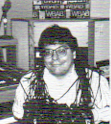by Dennis Daniel
 You can get ideas from just about any source. Listen to the language of life! Pay attention to every little detail around you.
You can get ideas from just about any source. Listen to the language of life! Pay attention to every little detail around you.
The question I'm often asked by eager young college students who want to pursue radio production as a career is: "How do you get your ideas?" Ah, what a quintessential question. All creative people are invariably confronted with this essential of all queries. The other question equally equivalent to this is: "How do you keep from burning out?"
There are several answers to these questions. First, keep your senses open to all that's around you. For example, if you're walking in the park and you notice two old men feeding pigeons...boom! There's an idea!
(SFX of pigeons cooing)
MAN #1: Howdy Able.
MAN #2: Hiya Sam.
MAN #1: Nice day to feed pigeons.
MAN #2: Yep.
(pause)
MAN #1: (yells) Why am I wasting my life?!
MAN #2: (still calm) You almost stepped on a pigeon, Sam.
MAN #1: I want excitement! I want to feel the joy and ecstasy of life flowing through every pore...every vein!
MAN #2: Well, you can always go to the sale at (fill in the blank)
And you take it from there. Now, I'm not saying this is a revolutionary new concept in advertising, or even that it's a great idea. I wrote it off the top of my head as I sit here. The point is, it's an idea. You can get ideas from just about any source. Listen to the language of life! Pay attention to every little detail around you. If you're standing in line at the supermarket and you hear a conversation between a wife and husband as they bag groceries, pay attention. Eavesdrop. There may be an idea there for you. Listen to the salesmen when they're on the phone with clients. There could be a wealth of creative ideas spewing out of their mouths. As you watch TV, look at the events of the day. Can you parody them in some way? Close your eyes and just think of the many human situations that occur, chances for conversation. There are hundreds! Thousands! With each new day comes a new idea. You just have to have enough imagination to look for it.
The second source for ideas can be drawn from your own life experiences: the things you love, your hobbies, your special interests such as movies, sports, model planes, S&M, whatever. If you're an expert on that subject, you can create ideas of your own from it. Past life experiences are also a wonderful source for creative inspiration. For example, I'm sure we all remember what it was like in school when the AV crew would come into class and the teacher would show a film. We used to see films in biology class all the time! In health class, we would watch films about personal hygiene. In driver's ed we would see those ghastly road kill films designed to scare the poop out of us! Usually, these films were pretty old -- from the forties and fifties.
Recently, my partner, Steve Morrison and I created a radio ad for Dr. Charles Ross, a local dentist. In it, we parodied these old films we used to see. The beauty of the concept is, most people can identify with the visual image conveyed. Theatre of the mind is in full effect. (Listen to this month's Cassette for the Dr. Ross ad.)
Keep in mind that when you try to do a parody of a true life situation, it's important to pay close attention to every detail. When you listen to the spot, note the tone of the performance. It's meant to mimic the lame acting and dialogue that usually accompanied these films. We used the board equalizer to get that "tinny" old movie sound effect. The Sound Ideas production library provides the 16mm movie projector sound, and the lame "bouncy" fifties style industrial generic music is the theme from "My Favorite Martian" in edited form. All of these combine to give you that perfect mind image.
The second example on this month's Cassette is the Car Tunes "Nosferatu" commercial. This idea was derived from our love of horror movies. It is essentially the Dracula story in miniature. Believe me, this spot sticks out like a sore thumb combined with the usual club spots and ad agency dreak that surrounds it. Once again, the sound effects add to the theatre of the mind aspects. The horse drawn coach, the low humming wind, the dogs howling, and the eerie performances.
Always make it a point to make your ideas as generic as possible. It shouldn't matter whether the audience has seen Dracula or not; the idea should stand on its own. If they don't get it, at the very least, it should be entertaining and informative. Of course, there's nothing wrong with taking creative risks now and then. In the end, we just want the commercial to stick out.
♦

